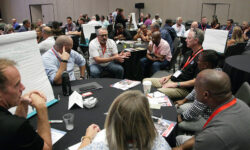Creating a Radio System Governance Model

Before each UT Austin football game, radio users are briefed on what interoperability channels are available for use in the case of an emergency. The university designates radio frequencies based on discipline – law enforcement, fire safety, medical – and geographical location – inside or outside the stadium.
Selecting the right two-way radio equipment for your campus is only part of the equation. Once you know what you need, it is essential to plan accordingly so that you can use your radio system in the most effective way possible.
For the University of Texas at Austin, becoming part of a cooperative regional radio system meant that university officials would have to coordinate radio frequency use with police, fire, security, medical personnel and other radio users. What emerged from that process was a governance model for radio use.
“The biggest thing you’re trying to do when you put together a cooperative radio system is create a structure so that everybody understands how it’s going to be managed,” says Gary Wilks, assistant manager for the Wireless Services Division of the City of Austin. “We made a governance model that covers everything from the financial aspect of it to the operational side. It needs to be clearly defined and agreed to, in that it’s a living document and it will grow and be modified, but there’s a governing board that’s made up of all the users who give the direction either directly or to a managing partner to make it work.”
Establishing Standard Talk Groups Saves Time
Wilks functions as UT Austin’s Communications Unit Leader (COML). In that position, he developed an incident radio communications plan using the ICS Form 205 provided by the National Incident Management System (NIMS), which, he says, is a kind of radio “cheat sheet.” The form defines the different frequencies that will be used by various personnel. For example, during a football game, frequencies are assigned by discipline and geographic location.
“We have 12 to 15 different talk groups that we’ll use for a football game, and we’ll split those between law enforcement, parking, medical inside the stadium, medical outside the stadium, fire response outside the stadium, fire protection systems for inside the stadium,” he says. “The groups are based on who you are…and then whether you’re geographically inside the stadium or outside the stadium.”
Radio Users Briefed Prior to Campus Events
Before a large event at the university, radio users will be briefed on which interoperability channels to use and given a radio frequency cheat sheet. Because all the users share a common radio system, says Wilks, no reprogramming is necessary. Communications are then managed by a group of representatives from each agency from a campus emergency operations center (EOC). UT Austin has five campus locations that can function as an EOC depending on the event.
[IMAGE]1604[/IMAGE]
“So if there were an incident, we have room silence, we have land lines if we need them and it also gives the communication commanders in the room the ability to direct their field staff over to another channel if they needed to. We’ll have a command channel in reserve just in case we need it,” explains David Cronk, UT Austin’s Director of Emergency Prepardness.
The efficiency with which UT Austin operates during large events is the product of long term planning. The regional radio network it operates on underwent extensive testing before various users transitioned. Development of the network began in 1996, but the university system did not go live until 2003.
“Any system you consider needs to be easy to use, reliable and it needs to be compatible with regional resources,” Cronk stresses. “I’m very fortunate to be involved with the City of Austin, because if you’re not active with your community partners in regards to communication planning, you need to be. There is great strength in numbers.”
Related Articles:
- Get Your 2-Way Radios Ready
- Learning to Accessorize: Pacific Hospital Embraces Radio Lapel Mic
- UT Austin: Proof Positive That Training, Relationships and Technology Pay Off
If you appreciated this article and want to receive more valuable industry content like this, click here to sign up for our FREE digital newsletters!
 Leading in Turbulent Times: Effective Campus Public Safety Leadership for the 21st Century
Leading in Turbulent Times: Effective Campus Public Safety Leadership for the 21st Century
This new webcast will discuss how campus public safety leaders can effectively incorporate Clery Act, Title IX, customer service, “helicopter” parents, emergency notification, town-gown relationships, brand management, Greek Life, student recruitment, faculty, and more into their roles and develop the necessary skills to successfully lead their departments. Register today to attend this free webcast!







